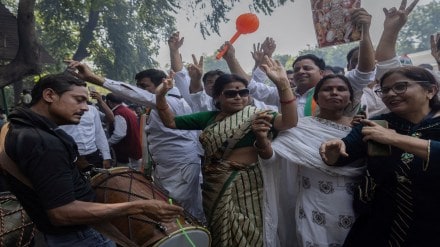The most important lesson for the Bharatiya Janata Party from its resounding defeat in the Karnataka elections is that it can’t keep depending on one man’s so-called magic wand and majoritarian politics to deliver the goods. While this hero-worship strategy might work in national elections, it has already started giving diminishing returns in state elections where local issues and concerns matter more. It is strange that a party that is as electorally savvy as the BJP failed to read the tea leaves even though the Modi juggernaut has failed to deliver in states where the local leadership has been perceived to be weak. Consider the data: the party has lost more than half the 57 state elections it has contested since May 2014.
The message is thus loud and clear: the BJP must develop a strong leadership pipeline in states if it wants to recover its image of a pan-India party. Prime minister Narendra Modi can facilitate big victories only if he has a credible state leadership to bank on. There are examples galore: Yogi Adityanath in Uttar Pradesh, Himanta Biswa Sharma in Assam and Shivraj Singh Chouhan in Madhya Pradesh, just to name a few. And it has come a cropper whenever it has failed to project a strong face against a charismatic opposition leader—West Bengal, Odisha and Delhi, for example. In Karnataka, it fielded a confused alternative to the two Congress strongmen—Siddaramaiah and D K Shivakumar. Modi’s frequent visits to the state over the last couple of months may have at best helped the party avoid a more humiliating defeat.
Also read: Will Congress’ Karnataka triumph impact Lok Sabha elections next year?
For the Congress, the results are no doubt a great morale booster after a series of humiliating losses. Unlike the immaturity shown in many other states that contributed to it snatching defeat from the jaws of victory, the party’s national leadership displayed its old deft touch in the way it handled the dissensions between its two top local strongmen in Karnataka. As political commentator Neerja Chowdhury has said in her column in The Indian Express, even as all communities in the state have voted for the party, the Congress has gone back to its old moorings: a pro-poor, other backward castes, Dalit and Muslim consolidation or “Ahinda” politics. By equating the PFI and the Bajrang Dal in its manifesto, by promising action against both minority communalism and majority communalism, the party took a calculated risk that has paid off.
Also read: A little less lonely together
But will the Karnataka outcome have any bearing on the 2024 general elections? The answer should be a resounding no. A national election is Modi’s turf where he will take on a rag tag group of opposition leaders, most of whom lack a national image. And the only one who is known nationally has failed to fashion an alternative ideological narrative. Rahul Gandhi must go much beyond his continuous “crony capitalism” jibes against Modi. The BJP can also take heart from the fact that just four months after losing the state elections in Madhya Pradesh, Chhattisgarh and Rajasthan, it won 62 out of the 65 Lok Sabha seats in the three states put together. Yet, it shouldn’t be lulled into complacency. The most disturbing signal from the Karnataka elections is that voters even in one of India’s most prosperous states are reacting adversely to economic distress and unending muscular politics. The BJP certainly needs to wake up and smell the coffee.
